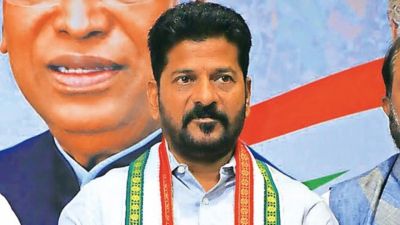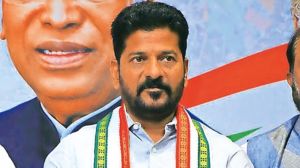Prem Kumar Dhumal: No comeback awaits two-time Himachal CM sidelined in BJP
Dhumal was widely expected to contest from Sujanpur but the party instead fielded Captain (retired) Ranjeet Singh.
 For Prem Kumar Dhumal, after the rocky start to his political career, the turnaround came in 1989 when he won the Hamirpur parliamentary election and then retained the seat in the general elections in 1991. (File)
For Prem Kumar Dhumal, after the rocky start to his political career, the turnaround came in 1989 when he won the Hamirpur parliamentary election and then retained the seat in the general elections in 1991. (File)Prem Kumar Dhumal made his political debut in 1984 when the Hamirpur MLA at the time, Thakur Jagdev Chand, refused to contest from the constituency. Though Dhumal’s beginning in electoral politics started on a rough note — he lost two elections in a row — he went on to become a central figure in Himachal Pradesh politics for the next three decades. But now, it seems, the two-time chief minister’s time in state politics is drawing to a close.
The BJP did not name Dhumal, 78, in its first list of 62 candidates for the November 12 Assembly elections issued on Wednesday. Instead of Sujanpur in Hamirpur district, from where he was widely expected to contest, the ruling party fielded Captain (retired) Ranjeet Singh. But the veteran leader has told The Indian Express that he was not denied a ticket but rather chose to opt out of the poll race.
For Dhumal, after the rocky start to his political career, the turnaround came in 1989 when he won the Hamirpur parliamentary election and then retained the seat in the general elections in 1991. Two years later, he became the state BJP president. But for Dhumal, the pinnacle of his political career was in 1998 when he became the chief minister of the state for the first time with the help of former Union communications and information technology minister and ex-Congress leader Sukh Ram.
Dhumal’s rise and fall
Sukh Ram was the information technology minister in the PV Narasimha Rao government from 1993 to 1996, when economic reforms were underway. As telephone connections started reaching homes, Sukh Ram ensured that the telecom revolution took root in Himachal, even in the state’s remotest and highest villages.
In 1996, Sukh Ram fell from grace when the CBI raided his homes in Mandi, Himachal Pradesh, and New Delhi and recovered huge amounts of cash. The Congress expelled him following this episode and Sukh Ram floated the Himachal Vikas Congress. The party also contested the 1998 elections and won four seats even as the Congress (29 seats) and the BJP (31 seats) failed to reach the majority mark in the 68-member Assembly. Elections for three tribal seats were conducted in May-June because of snow. So, the majority mark at the time of the elections was 33 seats.
Virbhadra Singh who was Sukh Ram’s rival in the Congress made a play for the top job, claiming he had the support of BJP rebel and former CM Shanta Kumar’s supporter Ramesh Dhawala who had won his seat as an Independent. Vir Bhadra Singh took oath as the CM and resigned in 13 days as he failed to prove his majority.
Shanta Kumar refused to form the government with Sukh Ram’s support because of the corruption allegations against the former minister. At the time, the central BJP leader in charge of Himachal Pradesh was Narendra Modi. despite opposition from Shanta Kumar, Dhumal formed the government with Sukh Ram’s support.
After coming to power, Sukh Ram pressured Dhumal to initiate enquiries against his old nemesis Virbhadra Singh and several inquiries into the Sagar Katha scam to land scam were initiated against the Congress leader. Dhumal gradually managed to sideline Sukh Ram but the BJP faction led by Shanta Kumar rebelled against the state administration. He managed to subdue the revolt and maintained his grip on the party. In a by-election for Solan in 2000, Dhumal backed a new face. Rajeev Bindal, who later went on to head the state BJP, won with the CM’s backing and overcame the opposition of the Shanta Kumar faction.
The Dhumal government was voted out in 2003 and the Congress led by Virbhadra Singh returned to power and launched inquiries against Dhumal. But the BJP leader weathered the storm and returned to power in 2007. Among those in his Cabinet was Jagat Prakash Nadda, the current national president of the BJP. But the relationship between Nadda and the then CM soured and Nadda ultimately stepped down from the government and moved to the leadership team in Delhi.
Dhumal faced another revolt, this time led by former state BJP president Maheshwar Singh who formed a new political party Himachal Lokhit Party (HLP) and the veteran leader could not retain power. This marked the beginning of his electoral decline even though his son Anurag Thakur, now a Union minister, started rising to prominence within the party. Dhumal became the Leader of the Opposition and this tenure marked acrimonious exchanges between him and Virbhadra, who had become the CM again.
The veteran leader was named the BJP’s chief ministerial candidate in the election five years later and though the party returned to power, he lost to the Congress’s Rajender Rana from Sujanpur by a thin margin. Subsequently, the Jairam Thakur-led state government sidelined the veteran and with Arun Jaitley’s death in 2019 Dhumal lost a prominent supporter in central BJP.
Dhumal played a minimal role even in the municipal polls last year. The party even sidelined his loyalists, the prominent among them being Colonel (retired) Inder Singh, the MLA from Sarkaghat and Gulab Singh Thakur, the former MLA from Joginder Nagar.
But the former CM’s loyalists have warned that the party is ignoring him at its own peril. “It will have a bearing on the party’s aim of ‘Mission Repeat’ in the state. No one knows why he (Dhumal) was denied a ticket. I do not know what formula was applied by the high command for the distribution of tickets for the polls. The party had earlier said that age would not be considered as a criterion this time around. Yet, Dhumal was denied a ticket,” said Inder Singh, who too was denied a ticket.
Asked about his loyalists not being fielded, Dhumal told The Indian Express, “I will work for the party and its candidates as and when I am needed for the upcoming polls.”





- 01
- 02
- 03
- 04
- 05


























